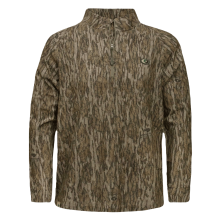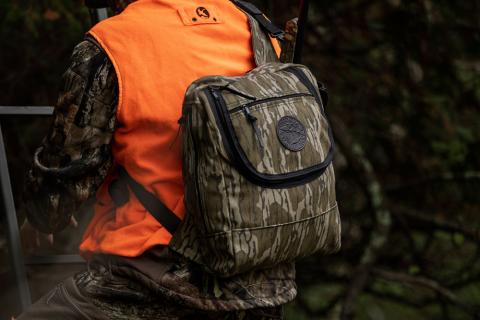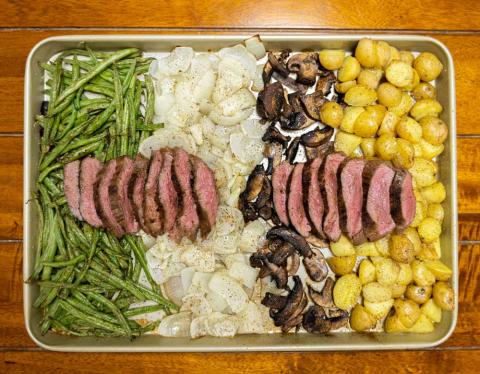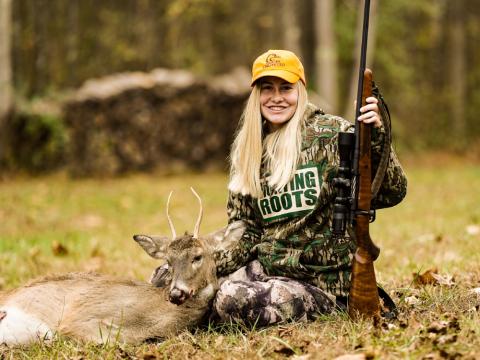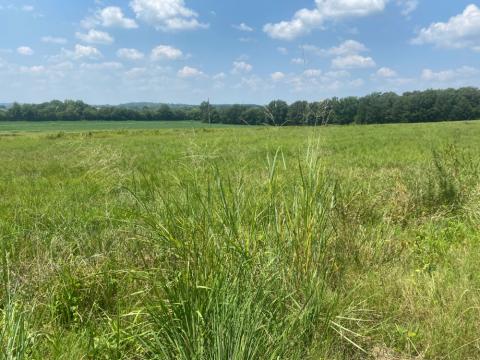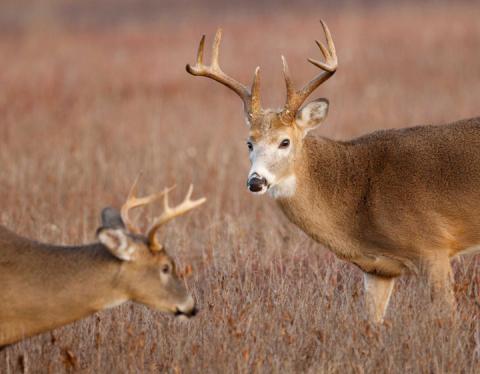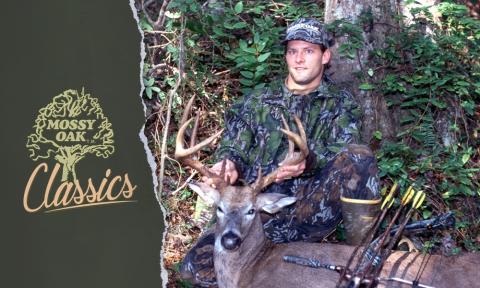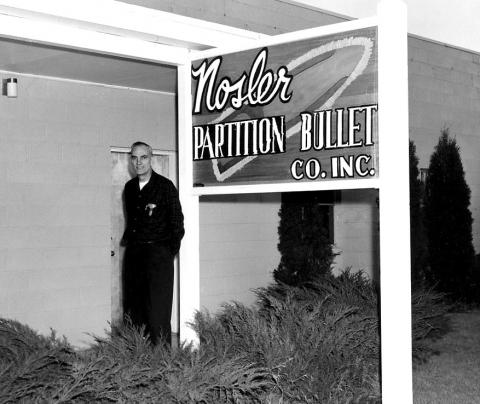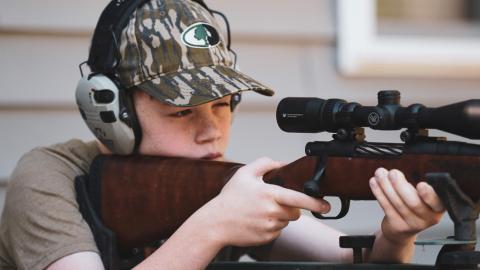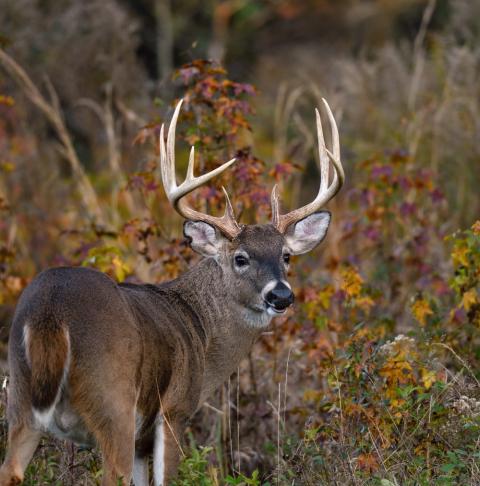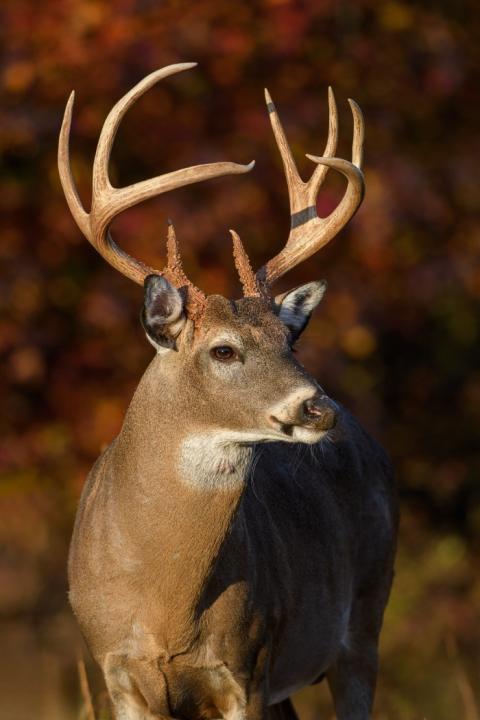provided by John E. Phillips
Ever since Mossy Oak Fishing Team Member Greg Hackney of Gonzales, Louisiana, was a boy, one of the biggest advantages he’s always had was his dad, Roger. “My daddy was my biggest fan,” Greg Hackney explains. “He was my sponsor and put 100 percent of his effort into my fishing journey. Back then, I had two passions: fishing and working in the logging industry. I spent most of my time on the water, but working for my dad’s logging company helped me support my fishing dream.” Hackney went to college for two years with a concentration in business and dropped out because he admits, “I liked to fish too much.” Hackney is a bass angler who’s a World Champion after winning the 2018 General Tire World Championship, a Forest Wood Cup Champion in 2009 and an Elite Series Angler-of-the-Year in 2014 – earning more than $3.7 million in career earnings to date. To learn more about Hackney, visit his Facebook page.
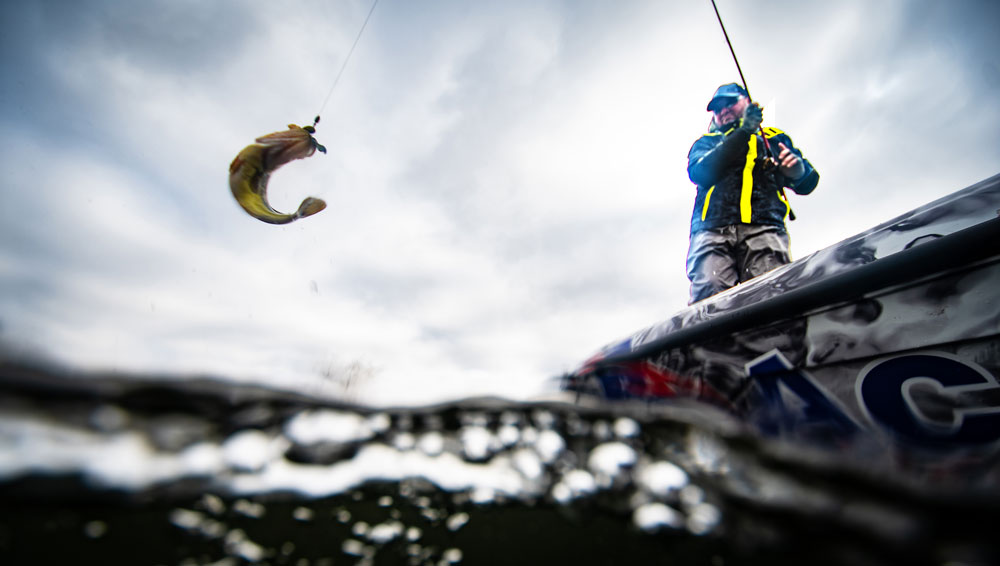
Greg Hackney’s Journey of Becoming a Professional Fisherman
If there’s ever been a person who defines the words passion (a strong feeling of enthusiasm or excitement for something or about doing something) and obsession (an idea or thought that continually preoccupies or intrudes on a person's mind), it’s Greg Hackney. Hackney always has been totally driven from a very young age to become a professional bass fisherman.
As proof of this, Hackney explains, “On May 8, 1999, I married my wife Julie and left the next day to fish an EverStart tournament. I finished this tournament in 5th place, and we didn’t have our honeymoon until August of that year. I told Julie before we got married that my goal in life was to become a professional bass fisherman. Today, she runs the household while I’m gone. Overall, Julie is a mother of four children, helps me with my fishing business and is also a veterinarian. So, to say she’s multi-talented is an understatement.”
Recently, when we caught up with Hackney, he had just finished the Bassmaster Elite Series tournament on the St. John’s River in Florida in March, 2021. After four days of fishing, Hackney caught a little over 69 pounds with a daily five-fish limit. For his effort, he came in second place and went home with a check of $35,000, bringing his total winnings from tournament fishing to about $4 million dollars, excluding sponsor money or any bonus money.
Phillips: When you were a little boy, would you ever have believed you would earn $35,000 for four days of fishing?
Hackney: No, although, I always dreamed of becoming a professional angler.
Phillips: What were you doing before you became a professional angler?
Hackney: I worked for my dad, who was a logging contractor. While working with him, I gained experience driving cut machines, skidders and loaders, and also learned how to run a chainsaw. When one of my dad’s employees was sick or on vacation, I’d just take over his jobs until he returned to work. During that time, I pretty much did everything that a logging contractor does and was glad to have the work.
Phillips: Greg, do you think your dad wanted you to take over his logging company?
Hackney: No, that wasn’t his dream for me. He really wanted me to become a professional bass fisherman, just like I wanted to be. When I was 11 years old, I fished my first tournament and didn’t do well, but that turned out to be the best thing that could’ve happened to me. Losing that tournament made me hungry for success, and since then, I pushed myself to become a better bass fisherman.
Phillips: When and how did you make the decision to leave that every-week, guaranteed paycheck and jump into the uncertainty of becoming a tournament bass fisherman?
Hackney: Even when I first started fishing tournaments, I still worked for my father in the logging industry. In June of 2003, I realized that I had so many sponsor obligations and was fishing so many tournaments that I just couldn’t work for my dad from that point forward. In 2004, I won the Rookie-of-the-Year title. At that time, I already had won a good deal of money to support myself, and the only times I went back to work for my dad was when he really needed me.
My dad was also a tournament angler. He was my team partner in my younger years. I was fortunate enough to grow up in a fishing family in a very small town in southeast Arkansas. Just about everyone I knew was a fisherman. The main sports in those days was hunting and fishing. There weren’t very many competitive teams for youngsters like there are today, and there really wasn’t anything else to do but hunt and fish where I lived.
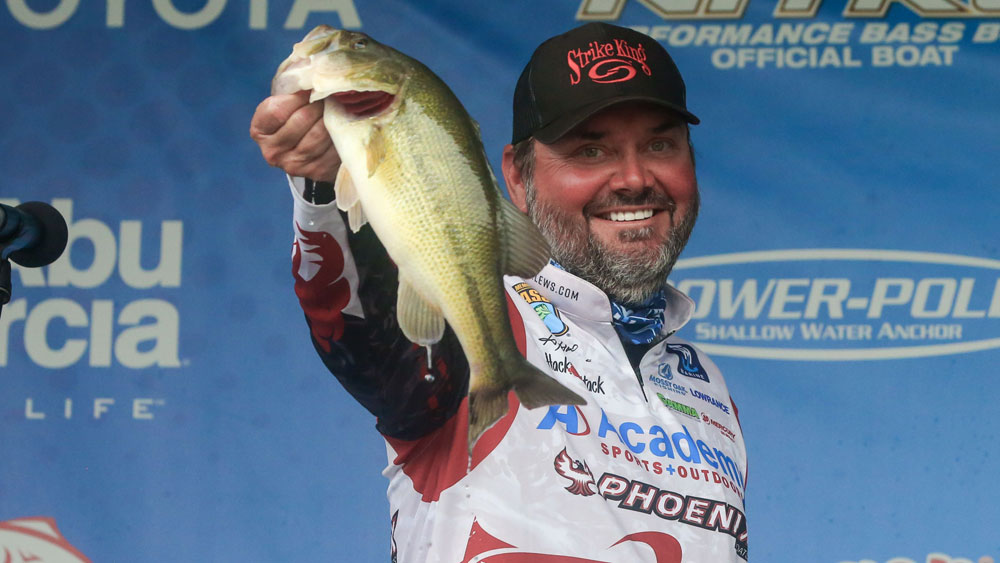
Professionalism as a Bass Pro and Sponsor Etiquette
Phillips: You’re probably one of the most driven tournament anglers on the professional bass-fishing circuits. What were the early days of your competitive fishing like?
Hackney: In 1999, I started fishing various bass tournaments all over the country. Before I married Julie, I knew I’d be on the road a lot, but I also knew that I could take care of our family by being the best bass fisherman possible. Since Julie follows her passion as a veterinarian at a small vet clinic that she still runs today, she completely understands my passion for bass fishing. I started fishing the FLW tour in 2001, so 2021 will be my 20th year as a professional bass fisherman.
Phillips: How do you get sponsors?
Hackney: I don’t know how you’re supposed to get sponsors, but as I’ve concentrated on fishing the best I can each day of each tournament, the sponsors have come to me. By that time, I was already well established as a tournament pro and was really fortunate that companies in the fishing industry recognized my skill as an angler. In my entire bass-fishing career, I’ve only sent out one resume. One of my favorite sayings is, “The rod and reel will take care of all your financial problems.” So, if you’re continuously winning and placing high in tournaments, then you won’t have to worry about sponsors.
Throughout my career, one of the most important things I’ve learned is sponsor etiquette. The day after the tournament at the St. John’s River in 2021, I was fishing with and being photographed by a writer. That afternoon, I got in my truck and headed straight for another writer event that was sponsored by Strike King Lures and Lew’s Fishing. I know what sponsors expect from pro anglers, and I have had to meet those responsibilities. Over the years, I’ve learned that the more you can do for your sponsors, the more value you give them for sponsoring you.
Once someone asks me, “What are some of the things that I need to do to have sponsors consider me?” I answer, “You need to carry yourself in a professional manner and catch bass. Those are the first two things for which a sponsor looks.”
When I think about someone sponsoring me, I try to put myself in that company’s place. In other words, if I’m sponsoring a fisherman, I’ll expect that person to act professionally anytime they’re out in public, whether at a tournament or a gas station. I also expect that angler to work with the press, especially if I provide a place and a time for the press to show up.
Something that’s different about having a regular job as opposed to a job in the fishing industry is that if you have a bad day at work, you can go home. Then nobody but your wife knows that you’ve had a bad day at work. However, when I’ve had bad days of fishing, everybody in the world knows because of the TV cameras filming me, writers writing about me and bloggers blogging about me. So, I’ve learned that in those moments, I still have to be professional. I can’t throw a temper tantrum, I can’t act badly, and I still have to be a gentleman - whether I want to or not. That’s sponsor etiquette.
Over the years, I’ve learned that in the professional fishing world, you’ll have good days and bad days. So, on good days, don’t get a big head, and act cocky like a know-it-all. On the bad days, you can’t act like a spoiled brat from whom someone has taken a sucker. Knowing that everyone realizes you’ve had a bad day and to handle that disappointment is tough. You have to have really thick skin. Overall, you’ve got to be just as presentable on the worst days as well as you are on the best.
To win the tournament, an angler has to make the right decisions from educated guesses. So, when you’re feeling as low as a snake’s belly, you still have to smile at the public and act professional. If someone wants an autograph, you give it to them anyway and smile as you’re doing it. That’s a big part of your job in representing your sponsors. Also, when writers call you, regardless of where you are, and what you’re doing, you have to pick up the phone and talk to them. Being a professional fisherman doesn’t come easy every day, but you’ve got to be like a duck when water’s poured on its back. Let the anger and the disappointment roll off your back the same way. That’s what I define as sponsor etiquette.
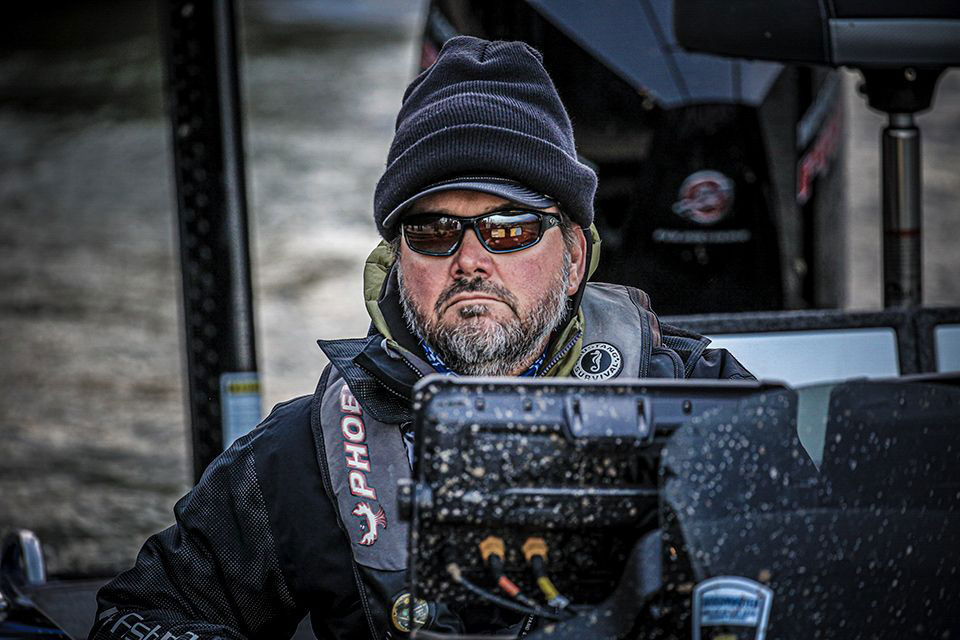
The Last Hours of a Tournament – Whether to Speed Up or Slow Down Fishing
Phillips: Greg, during the tournament that you just fished on the St. John’s River in the early spring of 2021, you were quickly moving up in the standings. On Day 1 you were in 19th place with 12 pounds and some change, while the tournament leader was at 25 pounds. On the second day, you produced 23 pounds and moved up to third place with a real shot at winning. Then on the third day, you caught another 23 pounds and moved up to second place, just 3 ounces behind the leader. By the final day, you were in the lead when you had a little over 11 pounds of bass, while the leader of the tournament only had 9 pounds. By the end of the day, you still placed second because the winner caught a total of 26 pounds. When you’re in the last hour of the tournament, and you’re only a few ounces from the lead, do you try to cover more water and fish faster, fish at the same pace you’ve been fishing at or slow-down your fishing?
Hackney: One of the most difficult decisions that a tournament bass fisherman has to make when he knows he’s within striking distance of winning a tournament is deciding what to do in the last hour to take over the lead and win. The first thing I think about is that I don’t want to fish too hard and spin-out because that will result in my losing the tournament. I’ve also learned that slow and steady typically wins the fishing race.
Phillips: Okay, Greg, let’s say that you’ve been fishing and flipping a jig that has gotten you within a few ounces of being the leader. What will you do now?
Hackney: I catch bass pretty good flipping a jig. But whether I’m fishing in a tournament or practicing, I’m always thinking about what other lure I can use to catch bass. Funny you should ask that question, since throughout practice on the St. John’s River, I caught all the prespawn bass on a buzzbait and a spinner bait. However, during the tournament, the weather warmed up, and the bass started going to the beds. Although I was fishing the same target areas, I caught bass pitching and flipping plastic lures because I realized the bass were in spawning mode. Instead of fishing fast like I did in practice, I fished slower and more deliberately. Due to my experience fishing in tournaments, I think many times I can slow down, use finesse baits and not panic during the last hour or two of a tournament. That’s exactly what I did on the St. John’s River. If I’m struggling or close to winning and may need only one or two more fish to get close to the lead, I’ll slowly fish a shaky-head worm or a wacky-rigged worm thoroughly, working the cover. Time and time again, this tactic has proven to produce more bass than running up and down the lake chucking and winding has.
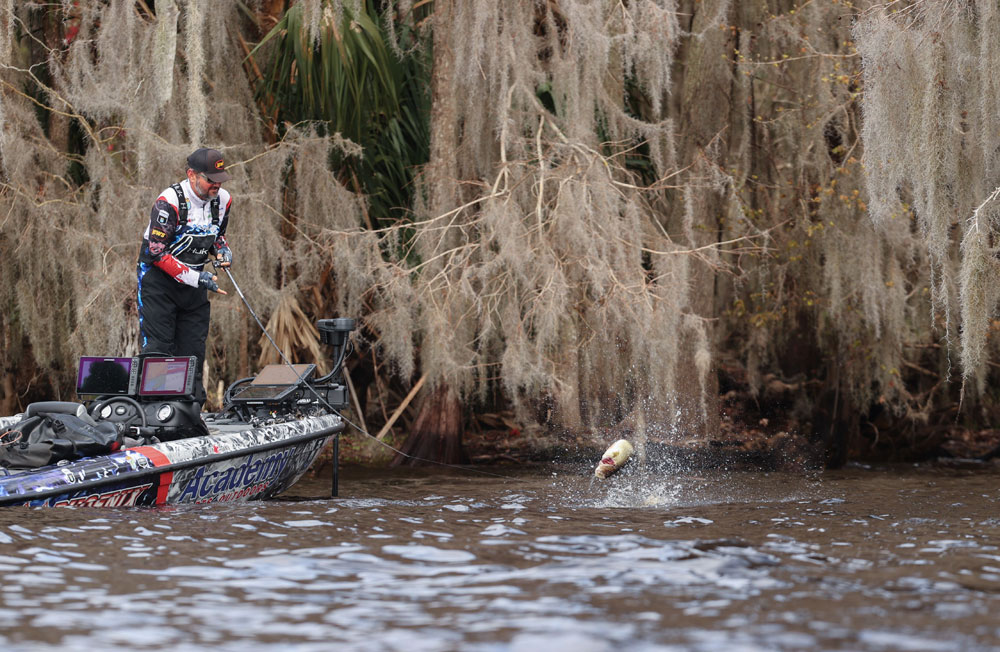
How to Become a Professional Fisherman
Phillips: What’s the number-one question you’re asked at most of the seminars and tournaments you attend, Greg?
Hackney: The main question that I’m generally asked is, “How do I become a professional bass fisherman?” The one trait that all of the best tournament anglers have is that they spend thousands and thousands of hours on the water trying to catch bass under all weather and water conditions. Most of the anglers who are lucky enough to get on the professional circuit already have spent much of their time on the water, learning to catch bass. There’s nothing that beats spending time fishing for bass to increase your odds for being successful as a professional bass fisherman. The road to becoming a pro doesn’t have any shortcuts. You have to build a personal database of information in your mind, so that you can pull from it anywhere and anytime you fish.
Other than spending most of their time on the water, the pros are also intensive researchers. I spend a ton of time watching old Bassmaster tournament videos to absorb as much information as I can about the lakes that I’ll be fishing in the future. When I’m studying, I want to know about the structures in the lake, what the bass should be doing at that time of year, what portion of the lake seems to produce the biggest bass, and what lures seem to be most productive for that time of the year. I also want to know how many pounds of bass are required to win the tournament that fishing. Not only do I spend a lot of time researching, but I also spend time on the water every year. If I’m being really honest, I’d like to spend five months out of the year deer hunting. However, I know that one of these days - possibly when I get older - I’ll be able to do that. Right now, I’m much more fishing-oriented than I am deer-oriented. I currently limit my deer hunting to Thanksgiving through Christmas (when we’re not having fishing tournaments). By January 1st each year, I start to practice catching bass three or four days a week before tournament season starts.
Phillips: Greg, how did you do your research before the days of the Internet, YouTube and all the other resources available today?
Hackney: Back then, I read “Bassmaster Magazine” and every other bass-fishing article I could find. I learned everything I could about new techniques and lures that I could use to catch bass. Once I felt comfortable enough, I’d buy some of those new lures, go to the lake and try to catch bass with them. One of the biggest learning experiences I had was figuring out how to fish with a spinning rod and reel. When I joined a bass-fishing club at 15 years old, everyone else was fishing with casting reels, so I had to teach myself how to maneuver a spinning rod and actually had a lot of fun while doing it.
One of the big advantages that young people have today that I didn’t have is that they don’t usually have to teach themselves how to tie knots, work lures, fish with spinning tackle and find new techniques to catch bass. Today, there’s so much information available on learning how to fish that the age of the average tournament pro is getting younger.
Phillips: Greg, today Bassmaster has tournaments for children from 2nd grade all the way up through college. How much influence have those tournaments had on producing bass-fishing pros compared to 20 years ago?
Hackney: The bass-fishing pros of today, and I’m talking about the good bass-fishing pros, are often much younger than the pros I fished against when I started. Today, the sport of bass fishing is much bigger than it ever has been in the past because of those bass-fishing circuits that cater to children and young adults. Young people are beginning to learn how much fun bass fishing is and even have learned that competitive bass fishing is even more exciting. Another reason that bass fishing has grown faster than at any other time in bass-fishing history is because of the COVID-19 pandemic. Students who once played basketball and softball or run track because of social-distancing guidelines were now catching bass on a lake. Adults who couldn’t work could go fishing. My youngest son and I fished 3 to 4 days a week during the quarantine, and I know that other dads did the same with their sons and daughters. So, as the fishing industry grows, the sport of tournament fishing is constantly expanding with students from elementary school through college - paving the way for even more pros in the future.
The Best Bass Teacher
Phillips: Greg, how are you able to keep up with all of these young people who, by the time they get to the ranks of the professionals, know how to research lakes and even may have 16 years of tournament experience?
Hackney: I’ve spent the last 20 years studying, researching and competing and nothing educates a would-be pro better than spending time on the water fishing and trying to catch bass. Physically, I’m not as young or as strong as these young pros are, but I have tons of experience at the highest levels. I’m 47 years old now, and I’m often asked, “How long do you think you can be competitive?” My answer is, “I still feel pretty good!”
One thing I’ve learned at my age is that I’m glad I took really good care of my body when I was younger. I ate healthy food and rode my bicycle a lot. Currently, my wife and I often go hiking. Like any other athlete, as I’ve gotten older, I’ve learned to appreciate the value of exercise and try to be as healthy as I can be. I know that if I’m going to keep up with all of these young, strong pros, I have to pay attention to staying fit and eating right as much as I did when I was younger.
Phillips: Greg, when you get to a tournament, what are you going to do before practice starts?
Hackney: Since I already have spent so much time researching the lake, I’ll begin to work on my tackle. Now, there are some things in bass fishing that you can’t control, but there are other things that you definitely can. These include: what’s the condition of your rods, reels, line and lures, how well your trolling motor, depth finder and outboard motor have been serviced, and where everything in your boat is placed. I’ll usually spend two full days organizing my equipment before I leave for a tournament.
For example, I just fished a tournament in Florida in early spring, and my next tournament will be in Knoxville, Tennessee. In Florida, I was fishing for spawning bass, and for the next tournament, the fish will be in their winter pattern still. So, I’ll need to reorganize my boat to where I’ll be prepared to fish a winter tournament. Before the tournament in Tennessee, I’ll get rid of all the heavy tackle that I fished with in Florida and pack smaller tackle.
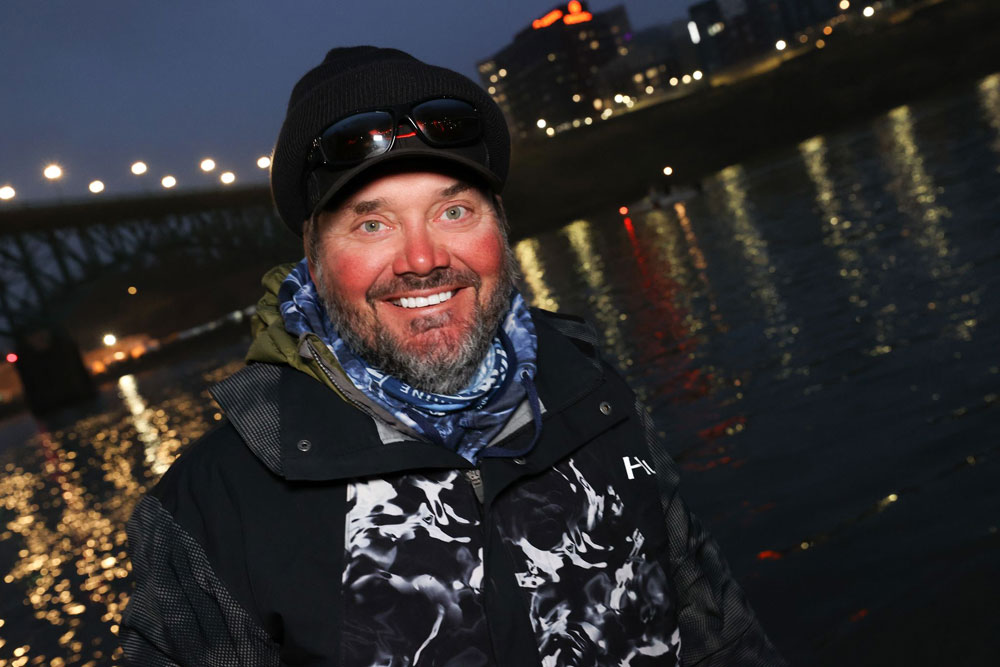
Phillips: Greg, you’ve always been known as a power-bait angler, but in today’s bass-fishing world, tournament anglers are using more of what we used to call sissy baits to what we now call finesse baits. How have you made that transition?
Hackney: I’ve used a spinning rod and light tackle all my fishing career because I’ve learned you can’t be a one-dimensional bass fisherman and consistently do well in all the tournaments you fish. In today’s world of bass fishing, an angler has to be extremely versatile. As I’ve mentioned earlier, the sport of bass fishing has grown tremendously nationwide in the last few years. For that reason, the fishing pressure on every lake has increased drastically, and that’s the reason more and more tournament anglers are using spinning tackle and finesse lures than they ever have in the past. The pros who are consistently successful now are just as good when they’re fishing a spinning rod as they are when they’ve got a bait casting rod and reel in their hands.
During the St. John’s River tournament in the early spring of 2021, I caught three of the bass I weighed in on a spinning rod, even though that lake was primarily set up as a power-fishing lake. I’ll always have a spinning rod and a finesse lure laying out on my casting deck because when you can’t get a bite, that spinning rod and finesse bait often can show you the way.
Phillips: You caught two of the biggest bass on the third day of that tournament with a spinning rod. What lure were you using?
Hackney: I was using a wacky-rigged worm. My favorite finesse baits are the wacky worm, the shaky-head worm and a dropshot worm. I’m also learning how to fish the Ned Rig. Sometimes, I’ll even fish a hair jig, and I’ve just started using a nail weight in the head of my wacky-worm rig. You can’t survive in today’s tournament bass fishing if you’re not versatile. Every bass fisherman has his strengths, and like you’ve said earlier, I’m a power fisherman. However, in today’s bass-fishing world, you don’t have to be great at every tactic or use every lure on the market, but you do have to be good at each style of fishing with every lure that’s on the market. The pros who continue to cash checks at every tournament are good at every form of bass fishing. They may be better with a spinning rod than they are with a flipping stick, but they’ll still be good with a flipping stick and catch bass with it.







